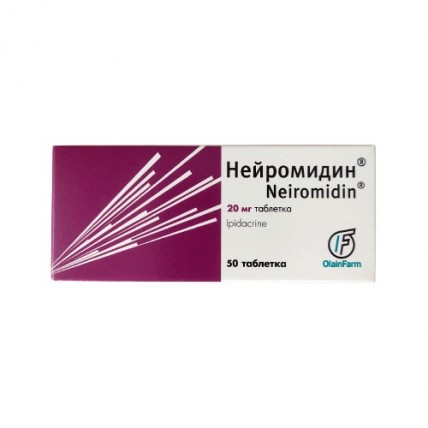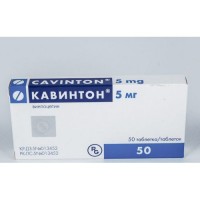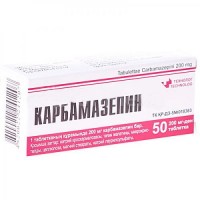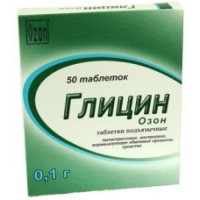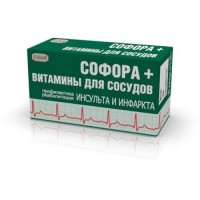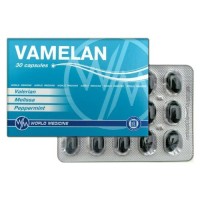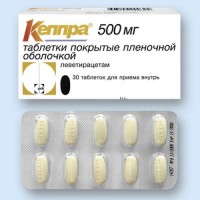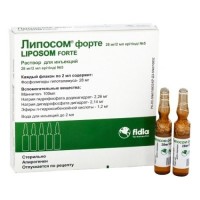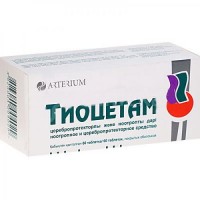NEIROMIDIN® (Ipidacrine) 20 mg, 50 tablets
- $41.20
One tablet contains the active ingredient: Ipidacrine hydrochloride 20 mg,
Excipients: lactose monohydrate, potato starch, calcium stearate.
After oral administration, ipidacrine hydrochloride is rapidly absorbed from the gastrointestinal tract. Absorption mainly occurs from the duodenum, to a lesser extent from the small intestine. The maximum concentration in blood plasma is reached in an hour. About 40-55% of the active substance binds to plasma proteins. The active substance quickly penetrates from the blood into tissues, overcomes the blood-brain barrier. After reaching an equilibrium distribution in the blood plasma, about 2% of the active substance remains. It is mainly metabolized in the liver by hydroxylation. Metabolites retain the same action profile, but the severity of their effects is much weaker. Elimination occurs renally and extrarenally, urinary excretion by tubular secretion predominates, and only 1/3 of the dose is excreted by glomerular filtration. The terminal half-life is 2-3 hours. When administered orally, only 3.7% of the dose is excreted in the urine unchanged. Does not accumulate.
Neuromidin® is a reversible cholinesterase inhibitor. The drug directly stimulates the conduction of an impulse in the neuromuscular synapse and in the central nervous system due to the blockade of the potassium channels of the membrane. Neuromidin® enhances the effect on smooth muscles not only of acetylcholine, but also of adrenaline, serotonin, histamine and oxytocin.
Neuromidin® has the following pharmacological effects:
improves and stimulates neuromuscular transmission;
Restores the conduction of impulses in the peripheral nervous system, impaired due to various factors (trauma, inflammation, exposure to local anesthetics, some antibiotics, potassium chloride, etc.);
enhances the contractility of smooth muscle organs under the influence of all agonists, with the exception of potassium chloride;
moderately stimulates the central nervous system in combination with the manifestation of individual sedative effects;
improves memory.
Indications for use
As part of complex therapy
- diseases of the peripheral nervous system (neuritis, polyneuritis, polyneuropathy, polyradiculoneuropathy, myasthenia gravis and myasthenic syndrome of various etiologies);
- bulbar paralysis and paresis;
- in the recovery period after organic lesions of the central nervous system, accompanied by motor disorders;
- demyelinating diseases of the nervous system (including multiple sclerosis);
- memory disorders of various origins (Alzheimer's disease, other forms of senile dementia);
- intestinal atony.
inside. Doses and duration of treatment are determined individually depending on the severity of the disease. The highest single dose is 40 mg, the maximum daily dose is 200 mg.
With neuritis: 20 mg 2-3 times a day. The course of treatment for acute neuritis is from 10-15 days, for chronic neuritis - up to 20-30 days. If necessary, the course of treatment is repeated 2-3 times with an interval of 2-4 weeks until a therapeutic effect is achieved;
With polyradiculoneuropathy: 20 mg 2-3 times a day for 30-40 days. The course of treatment is repeated many times with a break of 1-2 months until a therapeutic effect is achieved;
For myasthenia and myasthenic syndrome: 10-20 mg (1/2 - 1 tablet)
1-3 times a day. The course of treatment is from 1 to 2 months. If necessary, the course of treatment can be repeated several times with a break between courses of 1-2 months.
Recovery period for organic lesions of the central nervous system, accompanied by motor disorders: 20 mg 3 times a day for 60 days.
With demyelinating diseases of the nervous system (including multiple sclerosis): 20 mg 3-5 times a day for 60 days 2-3 times a year.
For memory impairment of various origins (including Alzheimer's disease): 20 mg 2-3 times a day.
The duration of the course of treatment is from 4 months to 1 year.
To prevent myasthenic crises in severe disorders of neuromuscular conduction for a period determined by the doctor, 1-2 ml (15-30 mg) of Neuromidin® 1.5% injection is administered intramuscularly or subcutaneously, then treatment is continued with the tablet form of the drug and the dose can be increased to 20-40 mg 5 times a day, the course of treatment is determined by the doctor and depends on the dynamics of the clinical picture. The maximum daily dose is 200 mg.
With intestinal atony: 20 mg 2-3 times a day for 1-2 weeks.
Often
- hypersalivation, nausea
- palpitations, bradycardia
- increased sweating
less often
-increased secretion of bronchial secretions
- after the use of high doses - dizziness, headache, weakness, drowsiness, muscle cramps, allergic reactions (skin itching, rash), vomiting
Seldom
- epigastric pain, diarrhea
Not known (cannot be determined from available data)
- bronchospasm
Salivation and bradycardia can be reduced by m-anticholinergics (atropine, etc.).
In these cases, reduce the dose or briefly (for 1-2 days) interrupt the drug.
- hypersensitivity to ipidacrine or to excipients of the drug
- epilepsy
- extrapyramidal diseases with hyperkinesis
- angina pectoris
- severe bradycardia
- bronchial asthma
- blockage of the intestines or urinary tract
- tendency to vestibular disorders
- peptic ulcer of the stomach or duodenum in the acute stage
- During pregnancy and breastfeeding
- children and adolescents under 18 years of age (adequate studies on the safety of the drug in children have not been conducted).
The presence of a sedative effect in the activity spectrum of Neuromidin® leads to some potentiation of the effects of hypnotic drugs (hexenal, chloral hydrate) in large doses, while in small doses Neuromidin® either does not affect or weakens the effect of hypnotics. The action and side effects are enhanced when used together with other cholinesterase inhibitors and m-cholinomimetic agents. In patients with Myasthenia gravis, the risk of developing a cholinergic crisis increases with the use of other cholinomimetic agents. The risk of developing bradycardia increases if b-blockers were used before the start of treatment with Neuromidin®. Cerebrolysin increases the effectiveness of the drug. Neuromidin® weakens the effect of local anesthetics, antibiotics.
Alcohol enhances the side effects of the drug.
If you miss your next appointment, take it as soon as you remember, but skip if it's almost time for your next appointment. Never take a double dose!
Use with caution in gastric and duodenal ulcers, thyrotoxicosis, diseases of the cardiovascular system, as well as in patients with a history of respiratory diseases or acute respiratory diseases.
The preparation contains lactose. Should not be used in patients with rare hereditary problems of galactose intolerance, the Lapp lactase deficiency or glucose-galactose malabsorption.
Features of the influence of the drug on the ability to drive a vehicle or potentially dangerous mechanisms
Neuromidin® can have a sedative effect, so people who experience side effects from the central nervous system, such as drowsiness, should refrain from driving.
In severe overdose, a “cholinergic crisis” may develop with symptoms: bronchospasm, watery eyes, increased sweating, pupillary constriction, nystagmus, spontaneous defecation and urination, vomiting, bradycardia, heart block, arrhythmias, hypotension, restlessness, anxiety, agitation, fear, ataxia, convulsions, coma, slurred speech, drowsiness and weakness. Symptoms may be mild.
Treatment: drug withdrawal, gastric lavage, symptomatic therapy, m-anticholinergics are used: atropine, cyclodol or metacin, which reduce the severity of overdose symptoms.
Store in a dry, dark place at a temperature not exceeding 25°C.
Keep out of the reach of children!
Shelf life 5 years
Do not use after the expiry date stated on the packaging.
Excipients: lactose monohydrate, potato starch, calcium stearate.
Pharmacological properties
Pharmacokinetics
After oral administration, ipidacrine hydrochloride is rapidly absorbed from the gastrointestinal tract. Absorption mainly occurs from the duodenum, to a lesser extent from the small intestine. The maximum concentration in blood plasma is reached in an hour. About 40-55% of the active substance binds to plasma proteins. The active substance quickly penetrates from the blood into tissues, overcomes the blood-brain barrier. After reaching an equilibrium distribution in the blood plasma, about 2% of the active substance remains. It is mainly metabolized in the liver by hydroxylation. Metabolites retain the same action profile, but the severity of their effects is much weaker. Elimination occurs renally and extrarenally, urinary excretion by tubular secretion predominates, and only 1/3 of the dose is excreted by glomerular filtration. The terminal half-life is 2-3 hours. When administered orally, only 3.7% of the dose is excreted in the urine unchanged. Does not accumulate.
Pharmacodynamics
Neuromidin® is a reversible cholinesterase inhibitor. The drug directly stimulates the conduction of an impulse in the neuromuscular synapse and in the central nervous system due to the blockade of the potassium channels of the membrane. Neuromidin® enhances the effect on smooth muscles not only of acetylcholine, but also of adrenaline, serotonin, histamine and oxytocin.
Neuromidin® has the following pharmacological effects:
improves and stimulates neuromuscular transmission;
Restores the conduction of impulses in the peripheral nervous system, impaired due to various factors (trauma, inflammation, exposure to local anesthetics, some antibiotics, potassium chloride, etc.);
enhances the contractility of smooth muscle organs under the influence of all agonists, with the exception of potassium chloride;
moderately stimulates the central nervous system in combination with the manifestation of individual sedative effects;
improves memory.
Indications for use
As part of complex therapy
- diseases of the peripheral nervous system (neuritis, polyneuritis, polyneuropathy, polyradiculoneuropathy, myasthenia gravis and myasthenic syndrome of various etiologies);
- bulbar paralysis and paresis;
- in the recovery period after organic lesions of the central nervous system, accompanied by motor disorders;
- demyelinating diseases of the nervous system (including multiple sclerosis);
- memory disorders of various origins (Alzheimer's disease, other forms of senile dementia);
- intestinal atony.
Dosage and administration
inside. Doses and duration of treatment are determined individually depending on the severity of the disease. The highest single dose is 40 mg, the maximum daily dose is 200 mg.
With neuritis: 20 mg 2-3 times a day. The course of treatment for acute neuritis is from 10-15 days, for chronic neuritis - up to 20-30 days. If necessary, the course of treatment is repeated 2-3 times with an interval of 2-4 weeks until a therapeutic effect is achieved;
With polyradiculoneuropathy: 20 mg 2-3 times a day for 30-40 days. The course of treatment is repeated many times with a break of 1-2 months until a therapeutic effect is achieved;
For myasthenia and myasthenic syndrome: 10-20 mg (1/2 - 1 tablet)
1-3 times a day. The course of treatment is from 1 to 2 months. If necessary, the course of treatment can be repeated several times with a break between courses of 1-2 months.
Recovery period for organic lesions of the central nervous system, accompanied by motor disorders: 20 mg 3 times a day for 60 days.
With demyelinating diseases of the nervous system (including multiple sclerosis): 20 mg 3-5 times a day for 60 days 2-3 times a year.
For memory impairment of various origins (including Alzheimer's disease): 20 mg 2-3 times a day.
The duration of the course of treatment is from 4 months to 1 year.
To prevent myasthenic crises in severe disorders of neuromuscular conduction for a period determined by the doctor, 1-2 ml (15-30 mg) of Neuromidin® 1.5% injection is administered intramuscularly or subcutaneously, then treatment is continued with the tablet form of the drug and the dose can be increased to 20-40 mg 5 times a day, the course of treatment is determined by the doctor and depends on the dynamics of the clinical picture. The maximum daily dose is 200 mg.
With intestinal atony: 20 mg 2-3 times a day for 1-2 weeks.
Side effects
Often
- hypersalivation, nausea
- palpitations, bradycardia
- increased sweating
less often
-increased secretion of bronchial secretions
- after the use of high doses - dizziness, headache, weakness, drowsiness, muscle cramps, allergic reactions (skin itching, rash), vomiting
Seldom
- epigastric pain, diarrhea
Not known (cannot be determined from available data)
- bronchospasm
Salivation and bradycardia can be reduced by m-anticholinergics (atropine, etc.).
In these cases, reduce the dose or briefly (for 1-2 days) interrupt the drug.
Contraindications
- hypersensitivity to ipidacrine or to excipients of the drug
- epilepsy
- extrapyramidal diseases with hyperkinesis
- angina pectoris
- severe bradycardia
- bronchial asthma
- blockage of the intestines or urinary tract
- tendency to vestibular disorders
- peptic ulcer of the stomach or duodenum in the acute stage
- During pregnancy and breastfeeding
- children and adolescents under 18 years of age (adequate studies on the safety of the drug in children have not been conducted).
Drug Interactions
The presence of a sedative effect in the activity spectrum of Neuromidin® leads to some potentiation of the effects of hypnotic drugs (hexenal, chloral hydrate) in large doses, while in small doses Neuromidin® either does not affect or weakens the effect of hypnotics. The action and side effects are enhanced when used together with other cholinesterase inhibitors and m-cholinomimetic agents. In patients with Myasthenia gravis, the risk of developing a cholinergic crisis increases with the use of other cholinomimetic agents. The risk of developing bradycardia increases if b-blockers were used before the start of treatment with Neuromidin®. Cerebrolysin increases the effectiveness of the drug. Neuromidin® weakens the effect of local anesthetics, antibiotics.
Alcohol enhances the side effects of the drug.
Special instructions
If you miss your next appointment, take it as soon as you remember, but skip if it's almost time for your next appointment. Never take a double dose!
Use with caution in gastric and duodenal ulcers, thyrotoxicosis, diseases of the cardiovascular system, as well as in patients with a history of respiratory diseases or acute respiratory diseases.
The preparation contains lactose. Should not be used in patients with rare hereditary problems of galactose intolerance, the Lapp lactase deficiency or glucose-galactose malabsorption.
Features of the influence of the drug on the ability to drive a vehicle or potentially dangerous mechanisms
Neuromidin® can have a sedative effect, so people who experience side effects from the central nervous system, such as drowsiness, should refrain from driving.
Overdose
In severe overdose, a “cholinergic crisis” may develop with symptoms: bronchospasm, watery eyes, increased sweating, pupillary constriction, nystagmus, spontaneous defecation and urination, vomiting, bradycardia, heart block, arrhythmias, hypotension, restlessness, anxiety, agitation, fear, ataxia, convulsions, coma, slurred speech, drowsiness and weakness. Symptoms may be mild.
Treatment: drug withdrawal, gastric lavage, symptomatic therapy, m-anticholinergics are used: atropine, cyclodol or metacin, which reduce the severity of overdose symptoms.
Storage conditions
Store in a dry, dark place at a temperature not exceeding 25°C.
Keep out of the reach of children!
Shelf life 5 years
Do not use after the expiry date stated on the packaging.
